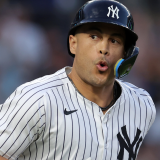We're nearly an eighth of the way through the 2019 season, yet closer Craig Kimbrel remains unsigned. Remarkably, Kimbrel is unemployed despite reasonable contract demands and few genuine arguments against his addition. More than two-thirds of the league could sign Kimbrel today to a deal worth $14-to-15 million and not have it impact their luxury-tax numbers or their potential to make further in-season additions. That no team has broken from the pack to this point means Kimbrel remains an opportunity for someone to get better -- an opportunity that, in theory, could help decide one division in particular: the National League East.
The Philadelphia Phillies entered Wednesday up a half game over the New York Mets in the division standings. The Phillies have since extended their lead with a head-to-head victory in a matinee game, but the Mets are just one of three (with the Atlanta Braves and Washington Nationals) who are expected to compete all year long with the Phillies for the division crown. At absolute most, the Phillies will be up 3 ½ games over the fourth-place Nationals at day's end.
It's worth highlighting then that each of those teams would benefit from signing Kimbrel -- and not just in the general sense that applies to all 30 clubs. Rather, there's a case to be made that the four teams in question are among the top five or six most sensible landing spots for a high-quality reliever like Kimbrel. With that in mind, allow us to illustrate by laying out the circumstances for each group. (Note that we're presenting these in alphabetical order.)
| 1 | |
| The last 24 hours have been no friend to the Braves bullpen. Atlanta's relievers permitted seven earned runs in three innings on Tuesday night, then lost closer Adrodys Vizcaino to season-ending shoulder surgery on Wednesday afternoon. The Braves rank 24th in bullpen ERA, but they have more than $65 million in tax space, which is a good chunk more than the other NL East contenders. As an added bonus, the Braves have a number of relievers with options, so they can't excuse their lack of interest by saying they lack flexibility -- they have plenty of it, financially and otherwise. The question for the Braves is whether they're serious enough about winning games right now to take a serious run at Kimbrel after abstaining for this long. | |
| 2 | |
| Of the four NL East contenders, the Mets have the best argument for not signing Kimbrel. It's not because they couldn't use the boost -- they rank 26th in ERA -- but because they already employ Edwin Diaz. Closers are (justifiably given saves equal dollars) territorial in nature, and it stands to reason both Diaz and Kimbrel want the ninth inning while they're at the height of their powers. Unless Kimbrel has no other suitors, he's probably not willing to take a demotion to join the Mets. Besides, New York might be better served using what's left on its budget (and do note they're $12 million away from the luxury-tax line) to sign Dallas Keuchel instead. | |
| 3 | |
| As with the Braves, the Phillies have plenty of room before they hit the luxury-tax line (more than $26 million). Philadelphia too have lost a reliever to injury (albeit less severe than Vizcaino's ailment), in David Robertson. The difference between the Phillies and the rest of the division is they don't have as apparent a need (they rank 12th in bullpen ERA) and don't necessarily have the roster flexibility to pull off the move as easily: Seranthony Dominguez and Victor Arano are the only two pitchers of the seven in Philadelphia's bullpen who have options remaining. It's probably too early for the Phillies to give up on one of their veterans, but who knows -- signing Kimbrel would be a wise strategical play for a couple reasons, including keeping him away from the rest of the division. | |
| 4 | |
| The Nationals make so much sense that it's hard to believe they haven't already signed Kimbrel. Washington has the worst bullpen in baseball as well as a closer, in Sean Doolittle, who is willing to shift to a setup role if it means adding a stud closer. Oh, and the Nationals are already known to be seeking bullpen help. The only -- and really, it does seem like the only -- thing holding the Nationals back is that they have less than $10 million in breathing room between their tax figure and the threshold. Ownership may have to pick between a trifling overage fee and shoring up the weakest unit on an otherwise competent, competitive team. | |


























